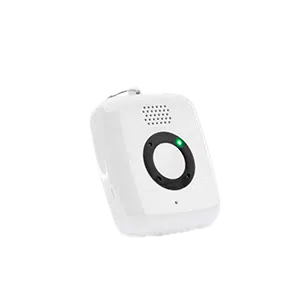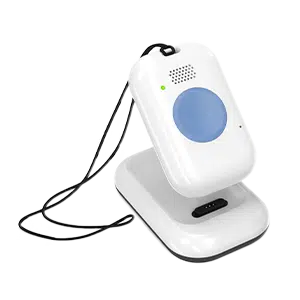The Caregiver's Guide: Tips & Support for Family and Loved Ones
Watching your loved one get older is a unique chapter of both your life and theirs. As you witness their needs and health change, your role as a caregiver becomes essential. Beyond companionship, you are critical support for your loved one as they navigate aging in place. At Lifeline Canada, we fully understand that each and every caregiver relationship is different and, at times, can be challenging. We’re here to help make times of transition smoother and support your loved one just as you do.
In this Caregiver Guide
- Understanding Caregiving
- Self-Care Simple Strategies for Caregiver Routines
- Essential Resources for Caregivers
- Top 10 Tips for Caring for Elderly Parents at Home
- How to Recognize and Manage Compassion Fatigue
- Building Resilience and Emotional Strength
- The Importance of Scheduling Breaks
- Long-Distance Caregiving and Getting the Right Help
Understanding Caregiving
Caregiving is a journey that many embark on, often unexpectedly, when a loved one needs extra help with daily tasks or health management. At its core, caregiving involves providing physical, emotional, and practical support to someone who can no longer fully care for themselves due to age, illness, or disability. But caregiving goes beyond just tending to another person’s needs—it’s about offering comfort, companionship, and reassurance that they are not alone.
Who Can Be a Caregiver?
Anyone can be a caregiver. While you may think of a caregiver as a professional in a uniform, the reality is that most caregivers are family members, friends, or neighbours who step up to help someone they care about. It might be the adult child helping their aging parent with doctor appointments, the spouse managing medications and meals, or even a friend ensuring that someone’s house is safe and secure. Caregivers come from all walks of life and often juggle caregiving with their own responsibilities, jobs, and families.
You don’t need specialized training to be a caregiver; what matters most is your willingness to help and your ability to adapt. Whether you provide care daily or from a distance, what you do makes a significant difference in your loved one’s quality of life.
Self-Care Simple Strategies for Caregiver Routines
Caring for others is a full-time job, and often, it’s easy to forget that taking care of yourself is just as important. While your schedule may be packed, incorporating a few self-care practices throughout the day can help rejuvenate your mind and body, even if you only have a few minutes to spare.

Two-Minute Breathing Exercises
When you feel overwhelmed, take a moment to pause and focus on your breath. A quick, two-minute deep breathing session can help calm your mind, refocus your thoughts and ease stress. Try inhaling deeply, counting to four, holding for four, and exhaling for six.
See also: eMentalHealth.ca: Deep Breathing

Simple Stretches While You Wait
Whether you’re waiting for a doctor’s appointment or in line at the pharmacy, use the time to do some simple stretches. Roll your shoulders, stretch your neck, or do a few leg stretches. These small movements can help ease physical tension from caregiving.
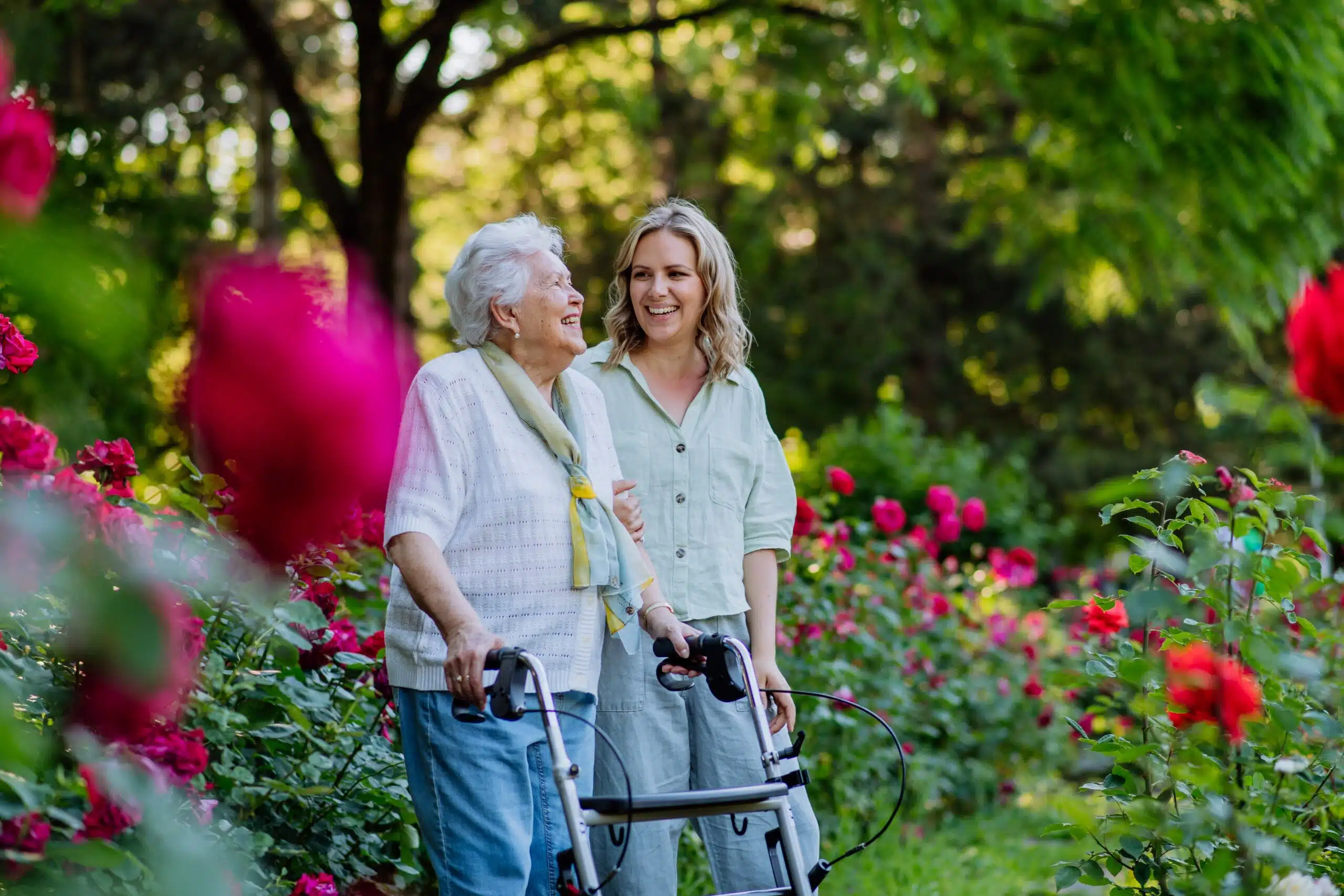
Mindfulness in Everyday Moments
Engage in mindfulness while doing routine tasks. Whether washing dishes or folding laundry, focus on the sensations—like the warmth of the water or the texture of the fabric. Being present in these moments can reduce stress and help you feel more grounded.
See also: University of St. Michaels College: Five Minute Wellness Break

End-of-Day Gratitude Reflection
Before bed, take five minutes to reflect on three things you’re grateful for that day. It could be as simple as enjoying a warm cup of coffee or having a few moments of laughter. This small practice can shift your mindset, helping you end the day on a positive note.
See also: Grateful Living: What is Gratitude?
Essential Resources for Caregivers
Being a caregiver is rewarding but can also be overwhelming at times. The emotional and physical demands can take a toll, especially when you feel like you have to manage everything on your own. That’s why it’s crucial to build a network of support and tap into resources designed to help you.
Caregiving doesn’t have to be a solo journey. Multiple resources are available to support caregivers—like respite care, local support groups, online forums, and professional caregiving services. Leaning on these resources can provide practical assistance, emotional relief, and valuable knowledge that makes caregiving more manageable.

Online Support Groups: Being able to talk to people all over the world who may be facing the same challenges you are facing is a great way to find support and answers for difficult situations. Online support groups don’t give you the face-to-face support you may want, but you’ll be able to talk to and get information from thousands of caregivers just like you. You can search for specialized caregiver support networks on the websites of the Canadian Cancer Society, Alzheimer Society of Canada, Parkinson Canada, and Heart and Stroke Foundation of Canada.
Local Caregiver Support Groups: For the in-person support that online groups lack, you can seek out local caregiver support groups. Sit and chat with other caregivers and get real-time solutions, information, and help. To find these groups, you can contact local places of worship, nearby senior community centres, or your local government’s website.

Telephone Hotlines: There are many caregiver hotlines where you can call and talk to someone about a challenge you are facing or an issue you’re not sure how to solve.
Social Media: Outlets like Facebook have groups and pages for anything you can think of, including senior care. Simply search for a group focused on caring for aging adults, and you can connect with people in the group, ask questions, and get recommendations.
Top 10 Tips for Caring for Elderly Parents at Home
While aging in place offers the benefit of being able to remain in a familiar location, it can also be challenging when it comes to household maintenance, like cleaning and keeping a safe environment. Here is a checklist of elder care at home.
- Ask your loved one to sign a release so you can speak to their healthcare team and have the contact information for their physician, specialists, and local hospital.
- Get up-to-date information on your family members’ prescription and OTC medications.
- Secure your own copies of legal documents like advance directives, living wills, social security, health insurance, etc.
- Assess home safety on your next visit to eliminate fall hazards and check the fire extinguishers, smoke and CO2 detectors.
- Investigate local organizations that specialize in home modifications or improvements for seniors.
- Consider a medical emergency response system with automatic fall detection that is designed to call for help even if your loved one can’t.
- Check out options for transportation, including ride-hailing apps.
- Support good nutrition by signing up for a meal or online grocery delivery services.
- Create a care circle — a group of family, friends and professionals — who help you support your loved one.
- Equip your loved one’s cell phone with apps for easy video communication with family and friends to reduce isolation and schedule regular phone calls.
Services To Make Aging in Place Easier For Seniors
As one gets older, some activities become harder to accomplish. To make life easier for a senior aging in place, consider looking into and implementing one or more of the following helpful services:
How to Recognize and Manage Compassion Fatigue
Being a caregiver is rewarding, but it also comes with emotional and physical demands that can take a toll on your well-being. Recognizing the signs of burnout and compassion fatigue sooner rather than later can help you take the necessary steps to protect your mental and physical health.
Burnout occurs when the stress of caregiving becomes overwhelming, leading to feelings of exhaustion, detachment, and frustration. Compassion fatigue is a specific form of emotional exhaustion, often experienced by those who provide care to others, where the emotional toll of empathy becomes too much.

Common Signs of Burnout
- Feeling tired all the time, even after resting
- Reduced performance in caregiving tasks
- Emotional detachment or apathy towards caregiving responsibilities
- Increased irritability or frustration
- Trouble concentrating or feeling scattered
- Feeling like caregiving is a burden

Common Signs of Compassion Fatigue:
- Feeling emotionally numb or disconnected from the person you are caring for
- Increased cynicism or negativity
- Difficulty sleeping or relaxing, even when you have time off
- Feeling overwhelmed by the suffering of others
- Loss of joy or satisfaction in caregiving tasks
Strategies for Preventing Burnout
If you notice these symptoms, it’s important to act quickly. Here are some specific steps you can take:
- Set Boundaries and Delegate Tasks: Learn to say no when needed, and don’t hesitate to ask for help. Whether it’s a friend, family member, or professional service, delegating tasks can give you the time and space you need to recharge.
- Take Regular Breaks: Even short breaks throughout the day can make a significant difference. Step outside for fresh air, take a walk or simply sit in a quiet space for a few moments of reflection.
- Seek Professional Support: Speaking with a therapist or counsellor can provide you with strategies to cope with the emotional stress of caregiving. Support groups for caregivers can also offer a safe space to share experiences and connect with others who understand.
- Canadian Centre for Caregiving Excellence: Caregiver Resources includes links to the websites of support organizations throughout Canada.
- Practice Self-Compassion: Be kind to yourself. Understand that you’re doing the best you can, and it’s okay not to have all the answers. Practicing mindfulness and self-compassion can help you manage emotional exhaustion.
- Take the Self-Compassion Test to better understand whether you need to increase the amount of self-compassion you practice daily.
- Focus on Self-Care: Incorporating small acts of self-care, such as getting enough sleep, eating balanced meals, and engaging in light physical activity, can improve your overall well-being and reduce feelings of burnout.
- Taking Care of Yourself: Tips for Caregivers provides quality information on the best ways to care for yourself as a caregiver.
Building Resilience and Emotional Strength
Caregiving is a journey full of emotional highs and lows. Building resilience can help you navigate these ups and downs while protecting your mental health. Resilience isn’t about avoiding difficulties—it’s about developing the emotional strength to handle challenges with more ease and self-compassion.

Practice Gratitude
Regularly reflecting on what you are grateful for, even during tough times, can shift your mindset from stress to appreciation. Start by writing down three things you’re thankful for at the end of each day, no matter how small. Over time, this simple practice can increase emotional resilience and improve your outlook.

Set Healthy Boundaries
Resilience comes from understanding your limits and setting boundaries to protect your energy. This might mean saying no to extra tasks or carving out time for yourself each day. Remember, setting boundaries isn’t about being selfish—it’s about ensuring you have the emotional bandwidth to provide the best care possible.

Find Positive Outlets for Your Emotions
It’s natural to feel overwhelmed, frustrated, or even angry at times. Finding a healthy outlet for these emotions, whether through journaling, physical activity, or creative expression, can help you release tension. For example, taking a short walk, writing about your experiences, or engaging in a hobby you enjoy can serve as emotional resets.
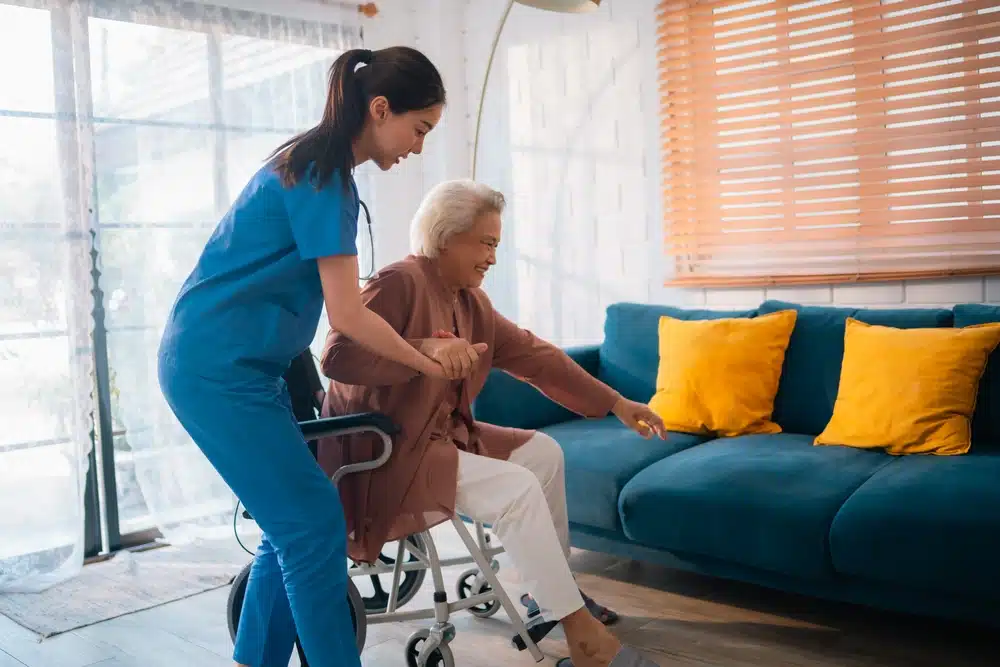
Focus on What You Can Control
Many aspects of caregiving can feel beyond your control. Focus on the things you can manage, like your self-care routines, how you respond to stress, and the actions you take each day. This mindset shift can reduce feelings of helplessness and empower you to take charge of your emotional well-being.
The Importance of Scheduling Breaks
Taking time away from caregiving may seem impossible when your responsibilities are constant. Statistics Canada reported that of caregivers spending 20 or more hours per week caring for a loved one, more than two-thirds noted having less time for relaxing and self-care as a result of their duties.
In addition, those who reported spending 20 hours or more a week on care were increasingly likely to feel stressed about their duties.
While many find caregiving rewarding, it is essential to step away now and then for your mental and physical health. Scheduling breaks allows you to return to your role feeling refreshed and more capable.

Use a Calendar or Timer
Make breaks a non-negotiable part of your day by adding them to your calendar, just like you would a doctor’s appointment. Even short, 5-10-minute breaks every couple of hours can make a difference. Set an alarm or use a timer to remind yourself to take a pause.

Plan Breaks Around Routine Tasks
Find moments in the day when you can naturally insert a break. For example, while the person you care for is resting or watching TV, use that time to step outside, enjoy a cup of tea, or practice deep breathing exercises.

Start Small
If taking a long break feels overwhelming, start small. Gradually increase the time you spend on yourself each day, and over time, you’ll develop a routine that incorporates self-care without disrupting your caregiving duties.
Asking for Help: It’s Okay to Share the Load
Caregiving doesn’t mean doing everything on your own. Asking for help is a sign of strength, not weakness. Involving others in caregiving tasks can give you the break you need while ensuring your loved one is still well-cared for.

Family Members and Friends
Don’t hesitate to ask close family or friends to step in for a few hours. Whether it’s running errands, providing companionship, or handling small tasks, letting others help can lighten your load and give you some much-needed rest.

Professional Caregivers
Consider hiring a professional caregiver for a few hours a week. Even part-time support can significantly relieve your stress, allowing you time to focus on your personal needs.
Long-Distance Caregiving and Getting the Right Help
Caring for a loved one from afar can be challenging, especially when proximity isn’t an option. However, with the right strategies and support, long-distance caregiving can be manageable and meaningful. Here are three key ways to effectively support your loved ones when you can’t be nearby:

1. Manage Your Loved One’s Finances
Taking charge of your loved one’s financial matters can be a significant way to provide support, offering both peace of mind and security. Begin by understanding the key financial responsibilities: setting up bill payments, managing budgets, and handling insurance or medical expenses. It’s also crucial to gather and organize essential legal documents, such as powers of attorney, wills, and advanced directives. These steps ensure that you’re prepared to make informed decisions and act fast when needed, helping to protect your loved one’s financial well-being.
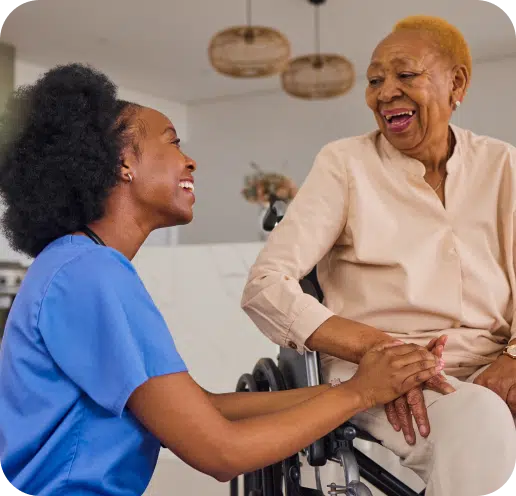
2. Arrange for Professional Non-Medical Caregivers
Hiring professional in-home caregivers can be a game-changer when providing direct support isn’t possible. Non-medical caregivers offer a range of personalized services, from helping with daily tasks like cleaning and meal preparation to providing companionship and coordinating transportation to appointments. This tailored care caters to each individual’s unique needs, whether physical, emotional, or cognitive. Plus, hands-on support ensures that your loved one receives the care they need, easing the burden on distant family members.

3. Consider Using in Home Medical Systems
Technology can bridge the gap between you and your loved one, offering peace of mind even when you’re miles away. Medical alert systems, such as Lifeline, provide a safety net with features like automatic fall detection, emergency response, and 24/7 monitoring. These systems enable seniors to access help at the push of a button, ensuring they are never alone in an emergency.
Renting a medical alert system offers significant flexibility as a caregiver by allowing you to opt for a monthly plan, meaning the device can be used as long as it’s needed. Additionally, these tools can be customized to meet specific needs, from medication reminders to health tracking, making caregiving more manageable and less stressful for everyone involved.
Long-distance Caregiving: How to Care for Your Loved One When You Live Far Away
Learn More About Our Medical Alert Systems













